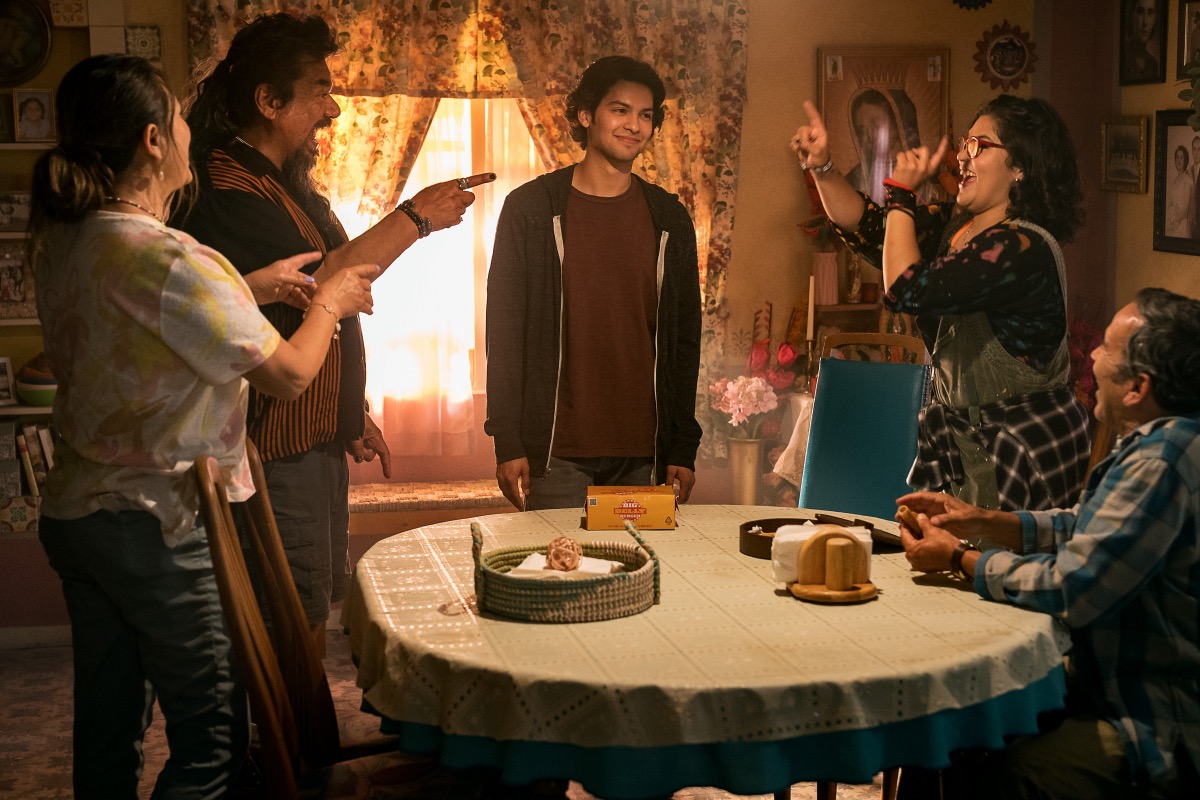

Xolo Maridueña, center, stars as Mexican American superhero Jaime Reyes, in DC Comics’ ‘Blue Beetle.’ (Warner Bros. Pictures)
The latest entry by DC Comics, Blue Beetle, carries a heavy weight.
As the first live-action superhero movie starring, written by and directed by Latinos, it’s supposed to signal Latinos’ cultural power. Here we are, finally getting that big-budget Hollywood blockbuster we’ve been asking for.
And, to be clear, folks have been asking for it pretty directly since before 2018, the year Black Panther came out and proved that POC-led and created fare translates into big bucks for studios.
But, of course, Blue Beetle premiered during the double SAG-AFTRA/WGA strike, meaning the talented Latino folks on camera —including Xolo Maridueña, Bruna Marquezine, Belissa Escobedo, Harvey Guillén and George Lopez— couldn’t promote it. So while Blue Beetle was able to knock Barbie off the top spot, it had to do so without its charming cast.
The press is ranging between calling its economic performance “one of the softest starts in the history of the DC Cinematic Universe” to “typical.”
With those obstacles, can this be the film that finally changes the narrative in Hollywood about Latinos’ bankability?
That remains unclear. But maybe instead of putting all that weight on Blue Beetle, we should just enjoy it for what it is—a mostly fun superhero flick (when we’ve had a million of them) distinguishing itself with its Latino texture and its celebration of family.
Yes, Blue Beetle is a typical origin story, the type we’ve become accustomed to from DC Comics and its competitors. There’s both good and bad in that. In Blue Beetle, we meet a colorful cast of characters and explore a compelling world in the fictional Palmera City. The film hits the beats of humble beginnings, powerful transformations and the temptations of new-found powers well, thanks to Maridueña and his on-screen family’s charm.
It also features many of the annoying bits of such movies as well. It’s overly long —at two-plus hours— instead of a more appropriate 90 minutes. And while Palmera City may be bright and colorful during the day, we get plenty of hard-to-distinguish night scenes, falling into Hollywood’s current dark-gray-on-black aesthetic, which is annoying, to say the least.
What begins to distinguish Blue Beetle is its Mexican American texture. Who knew it would be such a joy to hear “pendejo” so many times at the multiplex—and in all of its various meanings too?
There’s a scene where Jaime sets off to look for a new job, and what seems like the typical ambitious-boy-starring-up-at-big-city-sky-scrappers scene becomes something much funnier and more interesting when director Ángel Manuel Soto reveals the rest of the Reyes family behind Jaime. When Nana (Adriana Barraza) pulls Jaime in to give him a blessing, I couldn’t stop cackling.
There are all sorts of nods like these to Chicano culture, from the way the Reyeses decorate their house to what they watch on TV to even their sleeping arrangements. And while the film is firmly rooted in this particular family, it also gives an expansive definition of Latinidad, showing us Latinx characters of various backgrounds. I’m talking different nationalities, body types, socio-economic statuses, education levels, immigration statuses, political outlooks, and on it goes.
Seeing that diversity depicted within our community is refreshing and may go against some of the “this doesn’t reflect my experience” sentiment that Latinos seem to get stuck in.
What the film does best is celebrate family. For so long, superheroes have been orphans or lone wolfs, forged by their isolation. Not so with Jaime Reyes, and that’s not just implied but explicit in the film. Jaime and his fight partner trade lines about whether loving one’s family is a strength or weakness—and only the bad guys think it’s a weakness.
And while Jaime’s love interest, Jenny Kord (Bruna Marquezine), may come from all sorts of privilege, she’s right to point out the power of coming from a loving family. It may not get Jaime out of poverty or even keep all of the Reyeses safe, but it means at least as much as Jenny’s millions.
Plus, there’s the fact that everyone takes turns saving each other in the film. Jaime literally would not succeed without his family, and each one of his family members, including most memorably that blessing-giving abuela, is crucial to the success of his quest.
It’s a beautiful vision, one celebrating and spotlighting all of the ways Latino families show up for each member. And that focus on our families, that ability to lessen the individualism of even a super-powered superhero, well, that makes Blue Beetle different, more than the typical origin film we’ve come to expect.
It marks a change, and a very welcome one at that.
***
Cristina Escobar is the entertainment reporter for Latino Rebels. She is also the co-founder of latinamedia.co, uplifting Latina and gender non-conforming Latinx perspectives in media. She’s a member of the Latino Entertainment Journalists Association and writes at the intersection of race, gender, and pop culture. Twitter: @cescobarandrade



Blue Beetle is an enjoyable movie . La familia Reyes is/are the true superheroes in fun flick. Yes, I liked the movie.
[…] superpower. Lastly, for Latino Rebels, Cristina Escobar reviewed Blue Beetle, reminding us there is more behind the film than just Latino representation. The film celebrates and spotlights all the ways Latino families show up for each […]